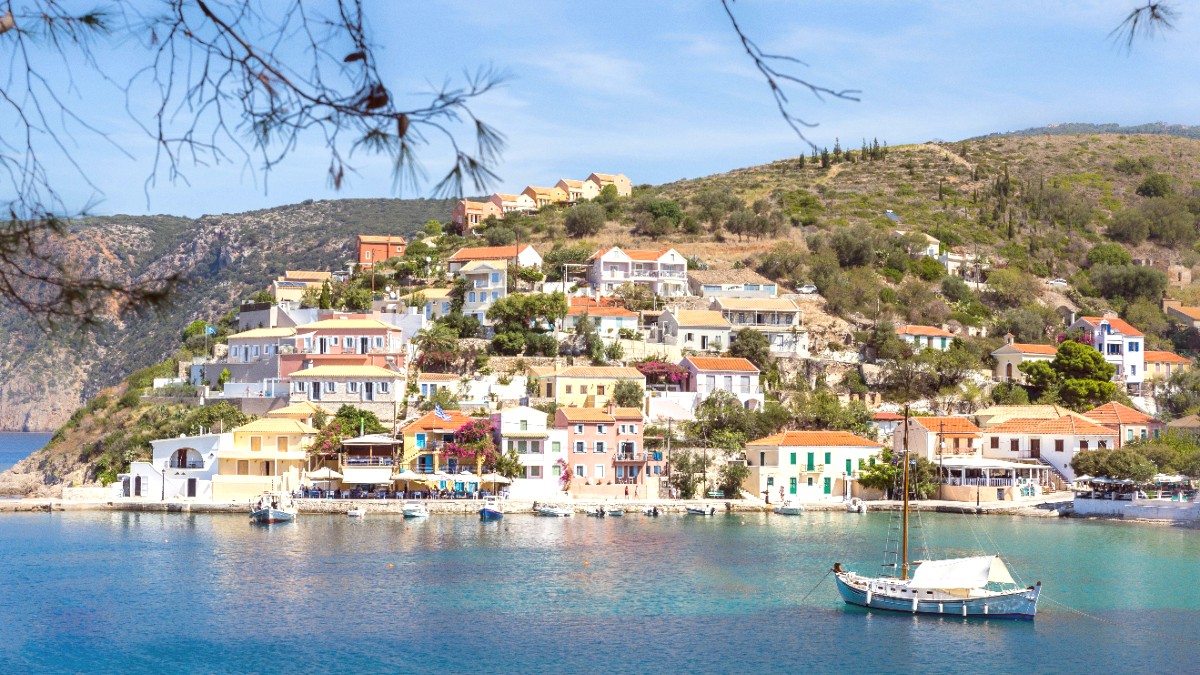
Greece
Kefalonia has a typical Mediterranean climate, with hot, dry summers and mild, wet winters. Spring (April-May) temperatures are mild, ranging from 15°C to 25°C. Humidity stays moderate. Summer (June-August) has hot and dry conditions, with temperatures typically between 28°C and 35°C, often rising higher. Rainfall is rare, and sunshine is abundant.
Autumn (September-October) temperatures stay warm, from 20°C to 28°C, keeping the sea perfect for swimming. Humidity lessens, and occasional rain starts towards late October. Winter (November-March) weather is mild and wet, with temperatures generally between 10°C and 18°C. This period sees the highest rainfall and can be windy.
During July and August, Argostoli can have heatwaves where temperatures consistently pass 35°C. Take precautions: stay hydrated, find shade during peak sun hours (12 PM - 4 PM), and use High-SPF sunscreen.
Prolonged dry periods in summer raise the risk of wildfires, especially in forested areas like Mount Ainos. Exercise extreme care with open flames, cigarettes, and barbecues. Winter months bring strong winds and heavy rainfall, which may change ferry schedules.
Peak crowds, highest prices.
Ideal beach conditions, all tourist facilities open, maximum choice for tours and water sports.
Crowds, highest prices for lodging and transport, intense heat. Book well in advance.
Good balance, fewer crowds.
Pleasant temperatures, fewer crowds, lower prices, warm sea for swimming. Lush landscapes.
Some smaller businesses may have limited hours. Flight schedules may be less frequent.
Authentic local feel, quiet.
Few tourists, lowest accommodation prices, green and peaceful island, good for hiking.
Many tourist places close. Limited transport. Cooler weather with more rain and wind.
June to September. The sea is warmest and most inviting.
April-May and September-October. Temperatures are cooler, and landscapes are at their most appealing.
May, June, and September. Comfortable temperatures and fewer crowds for exploration.
Shoulder seasons (May, June, September, October) offer softer light and fewer crowds.
Always use High-SPF sunscreen, Wide-brimmed hat, and Sunglasses.
Stay hydrated by drinking plenty of water, especially in summer heat.
Be extremely careful with open flames during dry summer months.
Greece is a member of the Schengen Area, meaning entry rules apply across 27 European countries.
Greece’s participation in the Schengen Area simplifies travel for many nationalities.
Always check you have the correct and complete documentation for entry.
The Euro (€) is the official currency.
Tipping is customary in Greece but not obligatory, nor is it expected at the same level as in some other countries (like the USA).
Greece is a safe country for tourists, but understanding common health concerns, emergency procedures, and local safety tips helps you prepare for any situation. This section provides information to keep you healthy and secure throughout your stay.
The Mediterranean sun is intense, especially in summer. High temperatures and activity raise the risk of dehydration. Mosquitoes are prevalent, specifically in the evenings and near water.
Sea urchins inhabit rocky coastal areas. Stepping on one may cause painful punctures. While food hygiene is high, some travelers may have minor digestive issues from diet or water changes.
Access to medical care is available. General Hospital of Kefalonia (Mantas Korgialenios) is the main public hospital. Private clinics and pharmacies (Farmakeia) are common.
EU citizens: Carry your European Health Insurance Card (EHIC) for state-provided healthcare.
For minor ailments, pharmacists offer advice and over-the-counter medications.
Tap water in Argostoli is generally safe to drink. Many locals and tourists prefer Bottled water due to taste or for added peace of mind. Food hygiene standards in reputable places are generally high.
Water quality is good; use LifeStraw for added filtration.
Wash hands frequently. Choose vendors with high turnover and visible hygiene for street food.
Kefalonia, including Argostoli, has a very low crime rate and is a very safe destination for tourists. Violent crime is rare. Petty theft, like pickpocketing, can occur in crowded areas.
Keep an eye on belongings in busy areas. Use hotel safes. Avoid leaving bags unattended.
No specific neighborhoods have higher crime rates. The town is safe for walking, even at night.
| Hazard | Description | Preparation |
|---|---|---|
| Earthquakes | Kefalonia is in an active seismic zone. Minor tremors are common; significant ones are rare. Modern buildings follow strict anti-seismic standards. | Familiarize yourself with hotel evacuation plans. In an earthquake, drop, cover, and hold on. Move to an open area if outside. |
| Wildfires | Risk during hot, dry summer months (July-August), especially in forested areas like Mount Ainos. | Exercise extreme caution with cigarettes, barbecues, and open flames. Report smoke/fire to 199 or 112. Follow local authority instructions. |
| Strong Winds | Occasional strong winds, notably in winter, may change ferry schedules or outdoor activities. | Check weather forecasts and ferry schedules if planning sea travel during windy periods. |